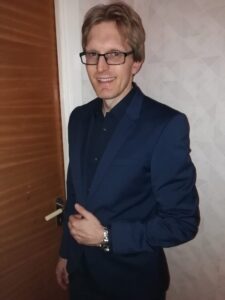Until I began my career in creative chemistry, I hadn’t considered my characteristics of my autism as evolutionary advantages.
By Burnett Grant
In recent years, it has become clear to me that higher education is viewed by many people as a means to get a job, something that hadn’t occurred to me when I was a student.
My goal in pursuing an education was to develop a world view, so that I could find my place in society, my niche, where I could experience endless intellectual development by following my interests—that which fascinates or disturbs me. Art and science fascinate me, and I rely on these interests as lenses through which to deconstruct a society that disturbs, confuses, and ignores me.
A couple of years after earning an undergraduate degree in film studies, I reapproached higher education through biology and chemistry with an emphasis on molecular science.
While earning a second bachelor’s, this time in molecular biology, I found comfort in logical, unchanging scientific theories and laws. Organic chemistry, for example, provides a means of universal communication of complex ideas between languages and neurotypes.
Applying these concepts to biological systems through biochemistry and molecular biology gave me additional frameworks for understanding behavior. It was through this discipline, engaged in a lab exercise involving isoamyl acetate, a sweet, banana-scented ester, that I first learned of the flavor industry.
About four years after leaving school, when I decided to relocate from Washington State to Ohio to live with my sibling, I was energized to find flavor houses in the area and targeted them for jobs.
In comparison, previous science roles I encountered outside of academia provided little room for creativity or out-of-the-box critical thinking, skills at which autistic people excel—we’re natural-born innovators. Creative chemistry has allowed me to merge my fascinations with science and art; the flavor industry provides me new perspectives on society, specifically through food and flavor trends—humans experience deep emotional connections with their food, and this influences the market.
There are about 500 certified flavorists worldwide, all of whom began as laboratory technicians before undertaking some sort of apprenticeship role, working their way through various trainings and certification processes.
When formulating a flavor compound, flavorists choose from thousands of raw ingredients based on their own creativity or chemical analyses of comparable finished products, like a popular convenience store soda, for example, and work with lab technicians to adjust levels of each ingredient to match a flavor in an already existing finished product, improve an existing flavor, or create a new flavor altogether.
Flavor chemistry also presented me with the rare opportunity to benefit from my heightened sensory awareness as much of my work involves constructing liquid flavor compounds and identifying the raw ingredients used to construct these flavor compounds by taste and scent.
More specifically, I manipulate molecules into flavor compounds that are used in commercial food and drug products like candies and lip balm. This process involves blending raw ingredients, FDA-approved flavor chemicals, into beakers at specific levels, then adjusting ratios of various components of the mixture until the taste matches the desired outcome.
The heightened sensory processing associated with autism is commonly framed as a deficit by neurotypical society largely due to the pathologizing of neurodivergence by medical communities who’ve unfairly misrepresented autism to the public as an illness. These widespread misbeliefs have negatively influenced how autists think and feel (about ourselves).
Until I began my career in creative chemistry, I hadn’t considered my characteristics of my autism as evolutionary advantages. Heighten sensory awareness is, however, one of many autistic traits that serve as advantages in my career.

Burnett Grant. is an openly autistic flavor laboratory technician and neurodiversity advocate in Cincinnati, OH where they reside with their autistic sibling and cats









Great story, worded so clearly and concisely…
Thank you Burnett Grant !
Diversity is the fuel of evolution;
Diversity is the fuel of progress;
Neurodiversity is the fuel of human evolution and progress.
So it is for me.
Love,
David Goren
David,
I appreciate you taking the time to read and comment.
I see diversity the same way.
Cheers,
Burnett